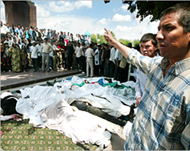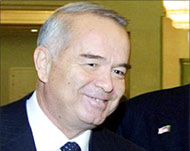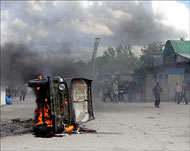Doctor: Uzbek protest toll about 500
About 500 bodies have been laid out in rows at a school in the eastern Uzbek city where troops fired on protesters to put down an uprising, a doctor in the town said.

Relatives were arriving at School No 15 in Andijan to identify the dead, said the doctor, who spoke by telephone on condition of anonymity.
Another 2000 people were wounded in the clashes on Friday, said the doctor, widely regarded as knowledgeable about local affairs. It was unclear how she arrived at her estimate.
The government has given no clear casualty figures. President Islam Karimov has said 10 government soldiers and many more protesters died and at least 100 people were wounded in the uprising, but witnesses reported hundreds killed.
Search for relatives
Distraught relatives searched for bodies in the smouldering city.
Smoke billowed from a government building that burned during the night and the streets were mostly empty of people and cars. The exception was the mortuary, where relatives came to look for their missing loved ones.
“I have been looking for two days for the bodies of my brothers,” said Bakhadyr Yergachyov, clutching his siblings’ passports.
 |
|
Witnesses say they have seen |
“They are neither at the morgue nor at the hospitals. I know
that they had gone to the square to participate in the
demonstrations.”
An accurate toll from the violence was impossible to come by, as soldiers guarding the city mortuary and hospitals denied entry to reporters amid a general media clampdown by the autocratic government.
AFP correspondents had seen up to 50 bodies on the streets, and local witnesses spoke of seeing up to 300 dead.
Innocents perished
The bloodshed started early on Friday, when weeks-long demonstrations over a trial of 23 local business people boiled over.
 |
|
Karimov says the demonstrators’ |
Prosecutors had accused the men of belonging to an outlawed Islamic group, but their supporters said the charges were fabricated.
After armed backers of the accused stormed a local prison to free them, along with some 2000 other prisoners, the military moved into the city that by then was gripped by mass anti-government protests. Witnesses accused the soldiers of firing indiscriminately into the crowd.
“The situation is terrible,” Nadyr, a worker at the Andijan market, said on Sunday. “The innocent perished. They placed weapons near the killed civilians to make people think that they are terrorists.”
Frustration explodes
Like many, he blamed the repression and corruption of the government in impoverished Uzbekistan for driving people to protest and the ensuing violence.
 |
|
Uzbeks accuse the government |
“We live very badly, I have trouble feeding my children,” he said. “This is the fault of the president. It is he who has reduced us to this situation and it was he who ordered the killing of the innocents.”
Karimov, a 67-year-old Soviet-era leader in the nation of 24 million who is supported by both Moscow and Washington, has blamed Islamic groups for the violence, and denied that the soldiers were given the order to shoot.
“Their aim is to unite the Muslims and establish a caliphate. Their aim is to overthrow the constitutional regime,” Karimov said on Sunday. He said soldiers fired only after being fired upon by the protesters.
Crackdown on Muslims?
Karimov’s government, wary of Islamic influences in a country that shares a border with Afghanistan, has moved on what it considers radical groups for years.
Critics say that in practice, this has meant a crackdown on practicing Muslims that has filled the nation’s prisons, fuelled discontent with the government and paradoxically has driven many to support the groups opposed by the government.
Although human rights groups have routinely charged Karimov’s government with using systematic torture in prisons and police stations, the United States has been mild in its criticism as Uzbekistan houses a US military base and is considered an ally in Washington’s war on terror.
Russia, fearful of Islamists as its battle against Chechen insurgents stretches into its 11th year, has also backed Karimov.
After the clashes, Kyrgyzstan, Tashkent’s eastern neighbour where mass protests overthrew a Soviet-era government in March, closed its border with Uzbekistan. But on Sunday, authorities said the border crossing at the city of Kara-Suu, which lies in both countries, would be open for five days.
“Uzbek and Kyrgyz authorities decided to open the border,” an official with Kyrgyz border authorities said.